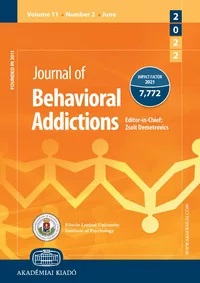Longitudinal associations between maladaptive daydreaming and psychological distress during the COVID-19 health crisis
Longitudinal associations between maladaptive daydreaming and psychological distress during the COVID-19 health crisis
Author(s): Alessandro Musetti, Nirit Soffer-Dudek, Chiara Imperato, Adriano Schimmenti, Christian FranceschiniSubject(s): Behaviorism
Published by: Akadémiai Kiadó
Keywords: maladaptive daydreaming; psychological distress; stress; anxiety; depression; COVID-19
Summary/Abstract: Background and aims. Maladaptive Daydreaming (MD) is a suggested syndrome where individuals become addicted to fantasizing vividly for hours on end at the expense of engaging in real-world relationships and functioning. MD can be seen as a behavioral addiction. However, a paucity of longitudinal research means that there is no empirical evidence confirming the stability of this alleged addiction. Moreover, the direction of its association with psychopathology is unclear. Methods. We examine, for the first time, long-term stability and longitudinal associations between MD, psychological distress (stress, anxiety, and depression symptoms) and COVID-19 related exposure. Results. Participants (N = 814) completed an online survey twice, with a lag of 13 months. A two-wave structural equation model demonstrated high MD stability and positive cross-lagged pathways from MD to psychological distress. COVID-19 related exposure was not a longitudinal predictor. Discussion and conclusions. MD is a stable condition and a risk factor for an increase in psychological distress.
Journal: Journal of Behavioral Addictions
- Issue Year: 12/2023
- Issue No: 1
- Page Range: 288-294
- Page Count: 7
- Language: English

